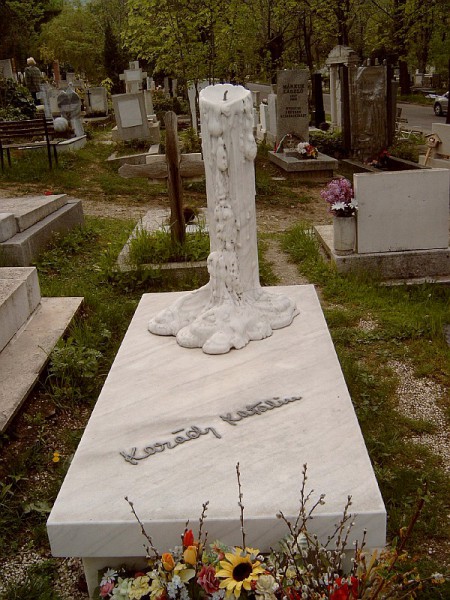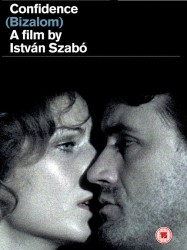Katalin Karády est une Actrice Hongroise née le 8 décembre 1910 à Budapest (Hongrie)

Katalin Karády (8 December 1910 – 8 February 1990) was a Hungarian actress and singer. A leading actress in Hungarian movies made between 1939–1945, she is best known outside Hungary as an awardee of the Righteous among the Nations honorific for rescuing a number of Hungarian Jews.
Katalin Karády was born as Katalin Kanczler, on 8 December 1910 in Budapest. She spent her childhood in Kőbánya district with seven siblings in great poverty. Her parents were Rozália Lőrinc and Ferenc Kanczler, a shoemaker, who Katalin remembered as an aggressive person. Helped by a charity organization, she spent five years in Switzerland and the Netherlands. After returning home, she studied in a Women's Marketing school, already famed for her beauty. With the language knowledge from previous years, her simple clothing and vigorous demand for cleanness she already stood out from her classmates. After her father's death in 1931 she married Rezső Varga, a customs official, 30 years older than herself, but they divorced after a few months.
She started acting in 1936, taking classes from Ernő Tarnay, and Artúr Bárdos. After gaining the attention of journalist Zoltán Egyed in a bar in Buda (who also proposed the name Karády) she was introduced to Ilona Aczél, a former actress, in whose acting school she learned the basics of the profession in the following three years, including singing. Karády's first performance was at the end of the 30s, in the Joób Dániel theatre. Between 1931 and 1941, she appeared in the Pesti and Vígszínház theatre in various roles.
Becoming a star
Her first movie role, Halálos Tavasz (Deadly Spring) gave her instant fame as a diva and sex-symbol, supported by her unusual, humming voice, and "femme fatale" character. In the next nine years, she appeared in 20 movies. Zoltán Egyed became her manager, and successfully created a Hollywood-like image around her, as a result, thousands of fans tried to mimic her clothing, hairstyle and behavior throughout the country. Karády's personal life was a constant topic of gossip, conflicting rumors came and gone about she being a man-eater, or lesbian. The theories were stirred up even more as she had intimate relationship with Regent Miklós Horthy's chief of secret service, István Ujszászy, who also proposed her, and bought her a villa.
Downfall
After the German invasion of Hungary, authorities put a pressure on Karády by banning her songs from the National Radio, her new film Machita from theatres, and stopping the ongoing production of Gazdátlan Asszony (later the crew finished the movie with Erzsi Simor). In 1944 she was arrested with allegations that she spied for the Allied Forces. Karády was in prison for 3 months, during which she was tortured, and nearly beaten to death. She was rescued by friends of major general Ujszászy, in dire condition both physically and emotionally. Despite mishaps, she carried on with life in the war-torn capital, even rescuing numerous families at the bank of the Danube waiting to be shot by Arrow Cross guards in exchange for personal belongings and gold, which she saved from her robbed apartment. She took a number of children home to care for them until the fighting stopped. In the summer of 1945 came the news from Moscow that general Ujszaszy was dead (later evidence showed that at that time he was still alive). Suffering from nervous breakdown, she lay in bed for the following nine months.
Later years
After the war, Karády became increasingly disregarded. Between 1945–48 she appeared in the Operettszínház in a few leading roles, the restarting Hungarian film production did not count on her (besides two movies, Forró mezők being her last). Being a popular star of the Horthy era, there was no place for her under the new communist rule. In 1949, all of her films were banned along with her theater appearances. Only being able to work at small venues in the countryside, often with a drunk audience, she left the country in 1951 permanently. First she lived in Salzburg, Austria, then moved to Switzerland, and after a year to Brussels. In 1953, she lived in São Paulo, Brazil, opening a fashion shop. In 1968, finally receiving a visa after Ted and Robert Kennedy intervened, she moved to New York, opening a hat salon. Performing rarely for friends only, she lived in retirement, refusing to appear in the media. Receiving a governmental invitation at her 70th birthday to return to Hungary, she only sent a hat, baffling officials. She died on 8 February 1990. At 19 February her body was transferred to Hungary, a memorial service was held in Budapest at the St. Stephen's Basilica, after she was buried in the Farkasréti Cemetery.
Source : Wikidata
Katalin Karády

Nom de naissance Katalin Kanczler
Nationalité Hongrie
Naissance 8 décembre 1910 à Budapest (Hongrie)
Mort 8 février 1990 (à 79 ans)
Récompenses Juste parmi les nations
Nationalité Hongrie
Naissance 8 décembre 1910 à Budapest (Hongrie)
Mort 8 février 1990 (à 79 ans)
Récompenses Juste parmi les nations
Biographie
Early yearsKatalin Karády was born as Katalin Kanczler, on 8 December 1910 in Budapest. She spent her childhood in Kőbánya district with seven siblings in great poverty. Her parents were Rozália Lőrinc and Ferenc Kanczler, a shoemaker, who Katalin remembered as an aggressive person. Helped by a charity organization, she spent five years in Switzerland and the Netherlands. After returning home, she studied in a Women's Marketing school, already famed for her beauty. With the language knowledge from previous years, her simple clothing and vigorous demand for cleanness she already stood out from her classmates. After her father's death in 1931 she married Rezső Varga, a customs official, 30 years older than herself, but they divorced after a few months.
She started acting in 1936, taking classes from Ernő Tarnay, and Artúr Bárdos. After gaining the attention of journalist Zoltán Egyed in a bar in Buda (who also proposed the name Karády) she was introduced to Ilona Aczél, a former actress, in whose acting school she learned the basics of the profession in the following three years, including singing. Karády's first performance was at the end of the 30s, in the Joób Dániel theatre. Between 1931 and 1941, she appeared in the Pesti and Vígszínház theatre in various roles.
Becoming a star
Her first movie role, Halálos Tavasz (Deadly Spring) gave her instant fame as a diva and sex-symbol, supported by her unusual, humming voice, and "femme fatale" character. In the next nine years, she appeared in 20 movies. Zoltán Egyed became her manager, and successfully created a Hollywood-like image around her, as a result, thousands of fans tried to mimic her clothing, hairstyle and behavior throughout the country. Karády's personal life was a constant topic of gossip, conflicting rumors came and gone about she being a man-eater, or lesbian. The theories were stirred up even more as she had intimate relationship with Regent Miklós Horthy's chief of secret service, István Ujszászy, who also proposed her, and bought her a villa.
Downfall
After the German invasion of Hungary, authorities put a pressure on Karády by banning her songs from the National Radio, her new film Machita from theatres, and stopping the ongoing production of Gazdátlan Asszony (later the crew finished the movie with Erzsi Simor). In 1944 she was arrested with allegations that she spied for the Allied Forces. Karády was in prison for 3 months, during which she was tortured, and nearly beaten to death. She was rescued by friends of major general Ujszászy, in dire condition both physically and emotionally. Despite mishaps, she carried on with life in the war-torn capital, even rescuing numerous families at the bank of the Danube waiting to be shot by Arrow Cross guards in exchange for personal belongings and gold, which she saved from her robbed apartment. She took a number of children home to care for them until the fighting stopped. In the summer of 1945 came the news from Moscow that general Ujszaszy was dead (later evidence showed that at that time he was still alive). Suffering from nervous breakdown, she lay in bed for the following nine months.
Later years
After the war, Karády became increasingly disregarded. Between 1945–48 she appeared in the Operettszínház in a few leading roles, the restarting Hungarian film production did not count on her (besides two movies, Forró mezők being her last). Being a popular star of the Horthy era, there was no place for her under the new communist rule. In 1949, all of her films were banned along with her theater appearances. Only being able to work at small venues in the countryside, often with a drunk audience, she left the country in 1951 permanently. First she lived in Salzburg, Austria, then moved to Switzerland, and after a year to Brussels. In 1953, she lived in São Paulo, Brazil, opening a fashion shop. In 1968, finally receiving a visa after Ted and Robert Kennedy intervened, she moved to New York, opening a hat salon. Performing rarely for friends only, she lived in retirement, refusing to appear in the media. Receiving a governmental invitation at her 70th birthday to return to Hungary, she only sent a hat, baffling officials. She died on 8 February 1990. At 19 February her body was transferred to Hungary, a memorial service was held in Budapest at the St. Stephen's Basilica, after she was buried in the Farkasréti Cemetery.
Le plus souvent avec
Filmographie de Katalin Karády (1 films)
Actrice

Confiance (1980)
, 1h45Réalisé par István Szabó
Origine Hongrie
Genres Drame, Historique
Thèmes Politique
Acteurs Ildikó Bánsági, Péter Andorai, Lajos Balázsovits, Zoltán Bezerédy, Katalin Karády
Note74%





Pendant les derniers mois de la Seconde Guerre mondiale, la vie de Kata prend un tournant inattendu. Elle apprend qu'en raison des activités de résistance de son mari, tous deux doivent se cacher quelque temps. Elle reçoit de nouveau papiers d'identité en tant qu'épouse de János Bíró, un réfugié transylvain, et découvre un nouveau foyer et un nouveau mari qui lui est inconnu. Kata, effrayée et ne sachant que faire, se tourne vers cet homme avec confiance et s'ouvre à lui, attendant de lui qu'il réponde à ses questions, qu'il la comprenne et la soutienne. Mais János Bíró, un combattant expérimenté du mouvement de résistance, a été rendu méfiant par des expériences humaines et historiques difficiles, et accueille Kata avec suspicion et froideur, exigeant d'elle la prudence la plus stricte vis-à-vis de tout et de tout le monde.
 Connexion
Connexion




